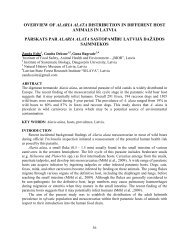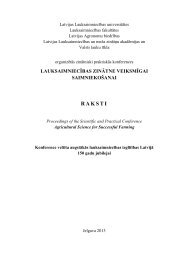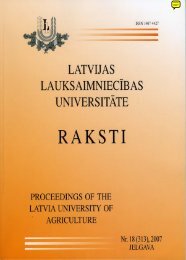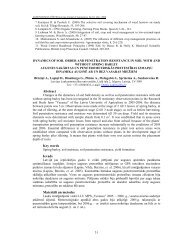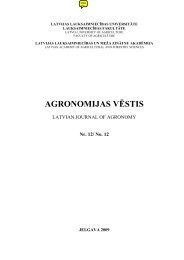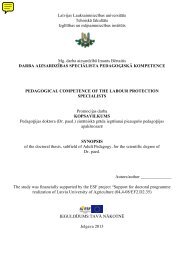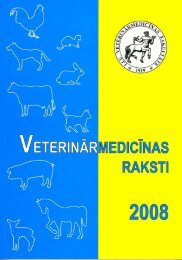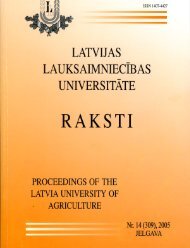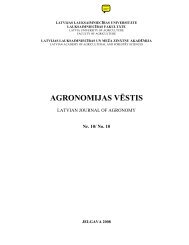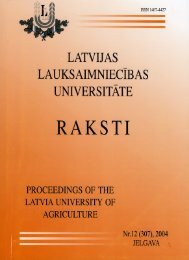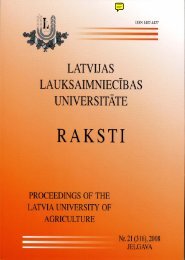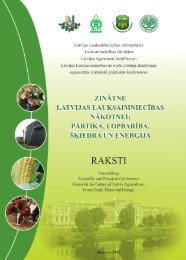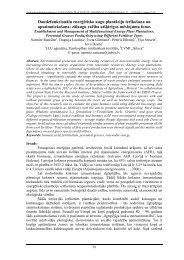Latvia University of Agriculture - Latvijas Lauksaimniecības ...
Latvia University of Agriculture - Latvijas Lauksaimniecības ...
Latvia University of Agriculture - Latvijas Lauksaimniecības ...
Create successful ePaper yourself
Turn your PDF publications into a flip-book with our unique Google optimized e-Paper software.
K. Špoģis, I. Pilvere Scientific Concern <strong>of</strong> Economists at the Turn <strong>of</strong> the CenturyE. Grinovskis (1996) has published his version <strong>of</strong> the concept for theagrarian policy.Elaboration <strong>of</strong> Scientific Fundamentals for Market Oriented <strong>Agriculture</strong> in<strong>Latvia</strong>During the second stage due to implementation <strong>of</strong> the research programme <strong>of</strong>national significance “Scientific Fundamentals for Agricultural Development in <strong>Latvia</strong>”the elaboration <strong>of</strong> the first sub-programme “Agricultural and Rural Development <strong>of</strong> <strong>Latvia</strong>Integrating into the European Union” was committed to the economists <strong>of</strong> Faculty underthe guidance <strong>of</strong> K. Špoģis. The other five sub-programmes and research leaders wereas follows:1) production <strong>of</strong> unpolluted and high-quality food (A. Jemeļjanovs);2) development <strong>of</strong> new and improved technologies for the production <strong>of</strong> foodproducts (D. Kārkliņa);3) development <strong>of</strong> new varieties <strong>of</strong> field crops (M. Belickis);4) breeding <strong>of</strong> productive animals and poultry (J. Nudiens);5) development <strong>of</strong> a competitive horticulture system (M. Skrīvele).The research results were comprised in a scientific monograph “Scientific Fundamentals<strong>of</strong> <strong>Latvia</strong> <strong>Agriculture</strong>” (1999). Scientific fundamentals <strong>of</strong> agriculture may be classifiedinto 5 thematic or problem groups:1) assessment <strong>of</strong> producing capacities <strong>of</strong> <strong>Latvia</strong>n agriculture on the conditions <strong>of</strong>market economy, and measures and tendencies for launching, implementationand development <strong>of</strong> potential opportunities;2) directions for the structural development <strong>of</strong> sectors displaying the prioritysectors;3) terms for development <strong>of</strong> agricultural priority sectors and establishment <strong>of</strong>infrastructure, technical and technological reconstruction <strong>of</strong> the terms;4) problems related to minimising production costs, maximising income and qualitymanagement as the basic conditions <strong>of</strong> sectoral competitiveness;5) possible economic mechanisms and instruments for the state impact and aid.The other four sections contain the research results provided by the specialists <strong>of</strong>other research sectors for the scientific provision <strong>of</strong> higher-value food production, problemsolutions related to pre-processing, processing and storage <strong>of</strong> agricultural produce, andscientific aspects related to the perfection <strong>of</strong> productive animal and poultry.Economics <strong>of</strong> Risk ManagementIt is well known that under the conditions <strong>of</strong> market economy sectors <strong>of</strong> primaryproduction as well as manufacturing sectors are subjected to various risks and factorsaffecting risks. This problem is also very topical on the conditions <strong>of</strong> <strong>Latvia</strong>; thereforesince 2002 riskology has its own research programme “Risk Factors, Assessment <strong>of</strong> RiskFactors and Risk Management in <strong>Agriculture</strong> <strong>of</strong> <strong>Latvia</strong>” the leader <strong>of</strong> which is Pr<strong>of</strong>essorP. Rivža. Scientists <strong>of</strong> several fields <strong>of</strong> <strong>Latvia</strong> <strong>University</strong> <strong>of</strong> <strong>Agriculture</strong> and other institutionsparticipate in the programme implementation.Later this programme was transformed into the programme “Management Systems <strong>of</strong>Risks and Crises in <strong>Agriculture</strong> <strong>of</strong> <strong>Latvia</strong>” with the sub-projects “Economic Opportunitiesand Threats <strong>of</strong> Risks and Assessment <strong>of</strong> their Consequences” (leader – K. Špoģis) and“Risks and Economic Threats <strong>of</strong> Crises Related to Primary and Secondary Spheres andAssessment <strong>of</strong> their Consequences”. The research results are published in two scientificmonographs – “Risks in <strong>Agriculture</strong> and Private Forestry” (2005) and “Management <strong>of</strong>Agricultural and Food Risks” (2007) – and several other publications. The research resultsare grouped by several directions.The study <strong>of</strong> management quality risk <strong>of</strong> agricultural enterprises and farms hasbecome a notably topical direction in riskology, since the consequences <strong>of</strong> inefficient,unpr<strong>of</strong>essional, incompetent, careless or incorrect management are increasinglythreatening expressed in the results <strong>of</strong> economic operation. Intellectual, social, economicand disposition risks are studied especially by their classification and assessment <strong>of</strong>opportunity and threat indicators.The second direction – economic assessment <strong>of</strong> natural risks in the regions <strong>of</strong> <strong>Latvia</strong>,notably identifying the possibilities for the decrease <strong>of</strong> negative consequences relatedto uncontrollable risks and increase <strong>of</strong> potential benefits in the regions <strong>of</strong> Kurzeme andZemgale.74 <strong>Latvia</strong> <strong>University</strong> <strong>of</strong> <strong>Agriculture</strong> – 70, 2009



